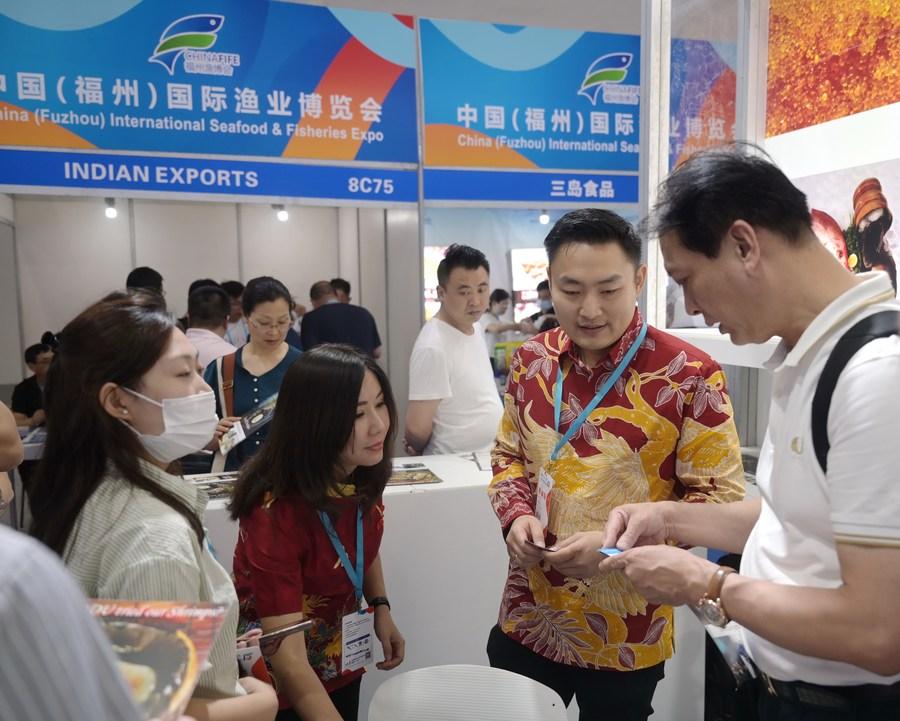China, Indonesia eye stronger economic bond in Belt and Road cooperation
 0 Comment(s)
0 Comment(s) Print
Print E-mail Xinhua, September 12, 2023
E-mail Xinhua, September 12, 2023

An Indonesian exhibitor (2nd R) presents products to visitors during the 2023 China (Fuzhou) International Seafood & Fisheries Expo in Fuzhou, capital of east China's Fujian Province, June 2, 2023. [Photo/Xinhua]
China and Indonesia are embracing closer economic ties with Belt and Road cooperation projects advancing at full throttle.
At the 23rd China International Fair for Investment and Trade that concluded Monday, four new ventures were signed and will be launched in the Yuanhong Investment Zone in the city of Fuzhou in east China, the site of the Chinese park of the "Two Countries, Twin Parks" project between China and Indonesia.
The four deals involve the wholesale of Indonesian aquatic products, fishing and processing, among other businesses. Fuzhou authorities say these deals will inject fresh momentum into China-Indonesia cooperation.
This development followed China's pledge last week to make the Regional Comprehensive Economic Corridor and "Two Countries, Twin Parks" new flagship projects of Belt and Road cooperation.
The Chinese park was officially set up in the Yuanhong Investment Zone upon approval by the State Council in January this year, and has posted steady progress since then. Two business fairs held in Jakarta in February and May, respectively, together sealed 36 deals worth around 64.8 billion yuan (about 9 billion U.S. dollars), while another one held in Fuzhou in May secured 10 projects with a total investment of 4.55 billion yuan.
"Two Countries, Twin Parks" is a new model of international cooperation featuring two countries setting up industrial parks on each other's soil and jointly facilitating development. The project with Indonesia includes three other Indonesian industrial parks -- the Bintan Industrial Estate, the Aviarna Industrial Estate and the Grand Batang City.
Industry insiders say the project can offer firms more opportunities by fostering trade. "It could help the two countries accept each other's industrial standards, smooth the two-way flow of talents and better complement each other on industry chains," said Shi Jie, vice chairman of Saneheld (Fuqing) Food Co., Ltd. The company's collaboration with an Indonesian firm gave rise to a fishery base with a daily output of 50 tonnes.
The company said it is building a processing factory for fish mince in Indonesia, with a planned launch in 2024. In the future, it will work with Indonesian partners to foster a complete industry chain from fishing to warehousing to create at least 5,000 jobs for Indonesian people.
Concerning the project between China and Indonesia, Fuzhou authorities envisioned five areas of industry chain cooperation, namely marine fishery, tropical agriculture, light industry, machinery and electronics as well as green mining. The Chinese park is now working to initiate 45 more ventures with a total investment of around 63.6 billion yuan.
Results of the "Two Countries, Twin Parks" project were achieved due to a growing China-Indonesia economic bond over the past decade, following the launch of the Belt and Road Initiative.
China has been Indonesia's largest trading partner for 10 consecutive years. In 2022, bilateral trade stood at 149.1 billion U.S. dollars, up 19.8 percent year on year.
"The Belt and Road Initiative's inception marked a turning point in Indonesia-China relations, catalyzing a renewed focus on business and economic synergy," Fajar B. Hirawan, head of the department of economics at the Centre for Strategic and International Studies, Indonesia, wrote in an article published in August.
China's vast market and Indonesia's strategic geographic location have paved the way for increased trade and investment, promoting economic integration within the Southeast Asian region and Asia Pacific, he wrote.
Experts say future areas of cooperation could center on clean energy, the biochemical industry, artificial intelligence and marine fishery.
Ten years into the Belt and Road Initiative and the China-Indonesia comprehensive strategic partnership, the two countries share more common interests at bilateral, regional and global levels than ever before, and cooperation is becoming more imperative, according to Zou Zhiqiang, a researcher at the Institute of International Studies at Fudan University.






Go to Forum >>0 Comment(s)